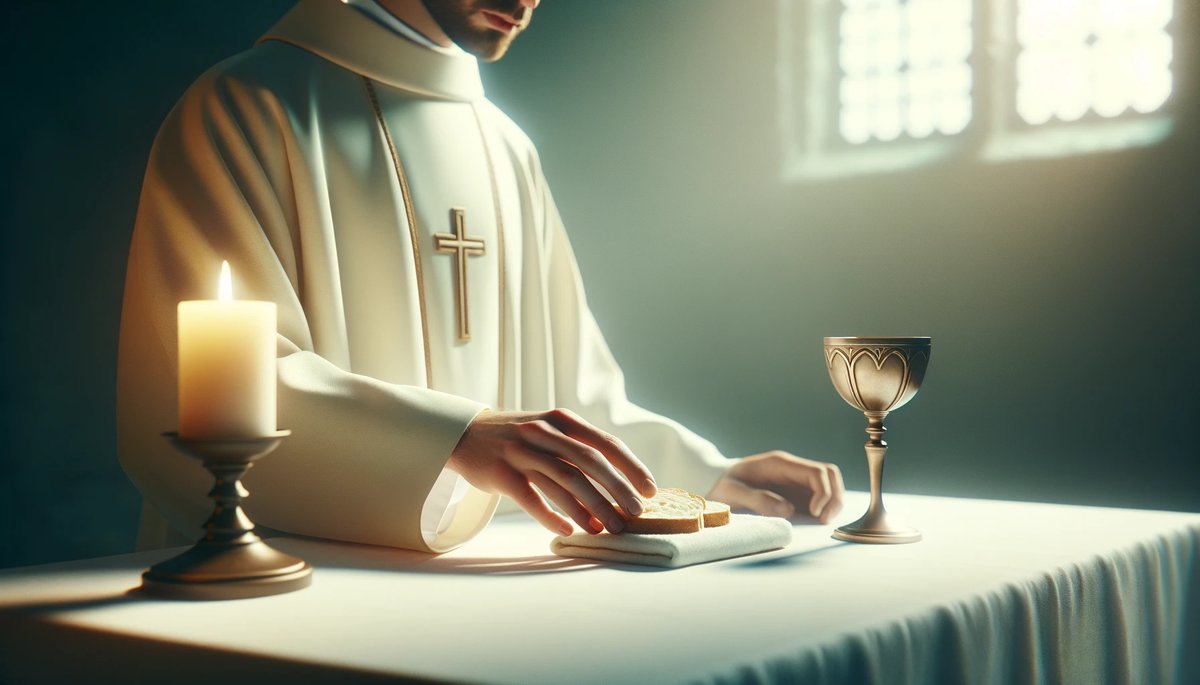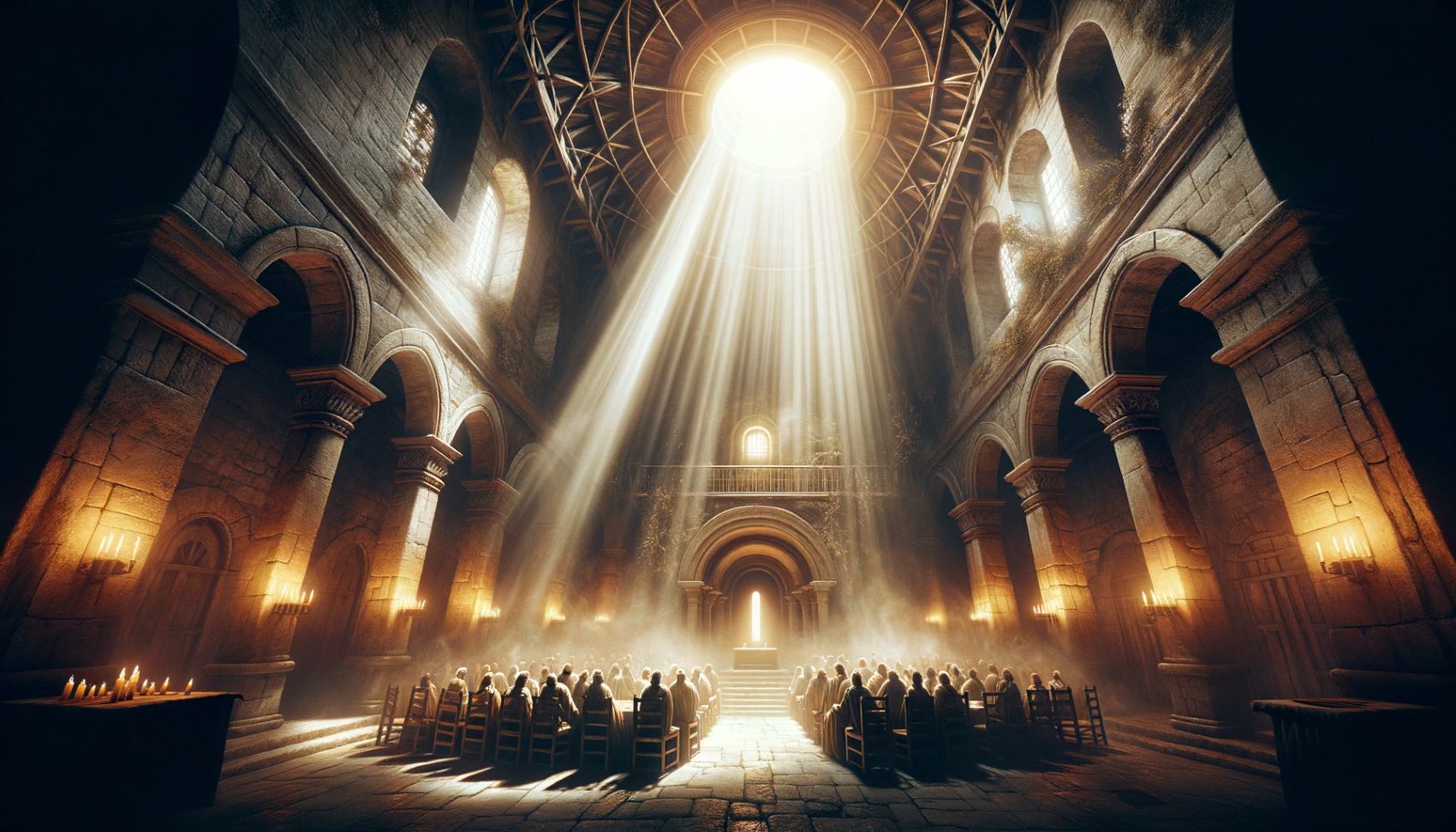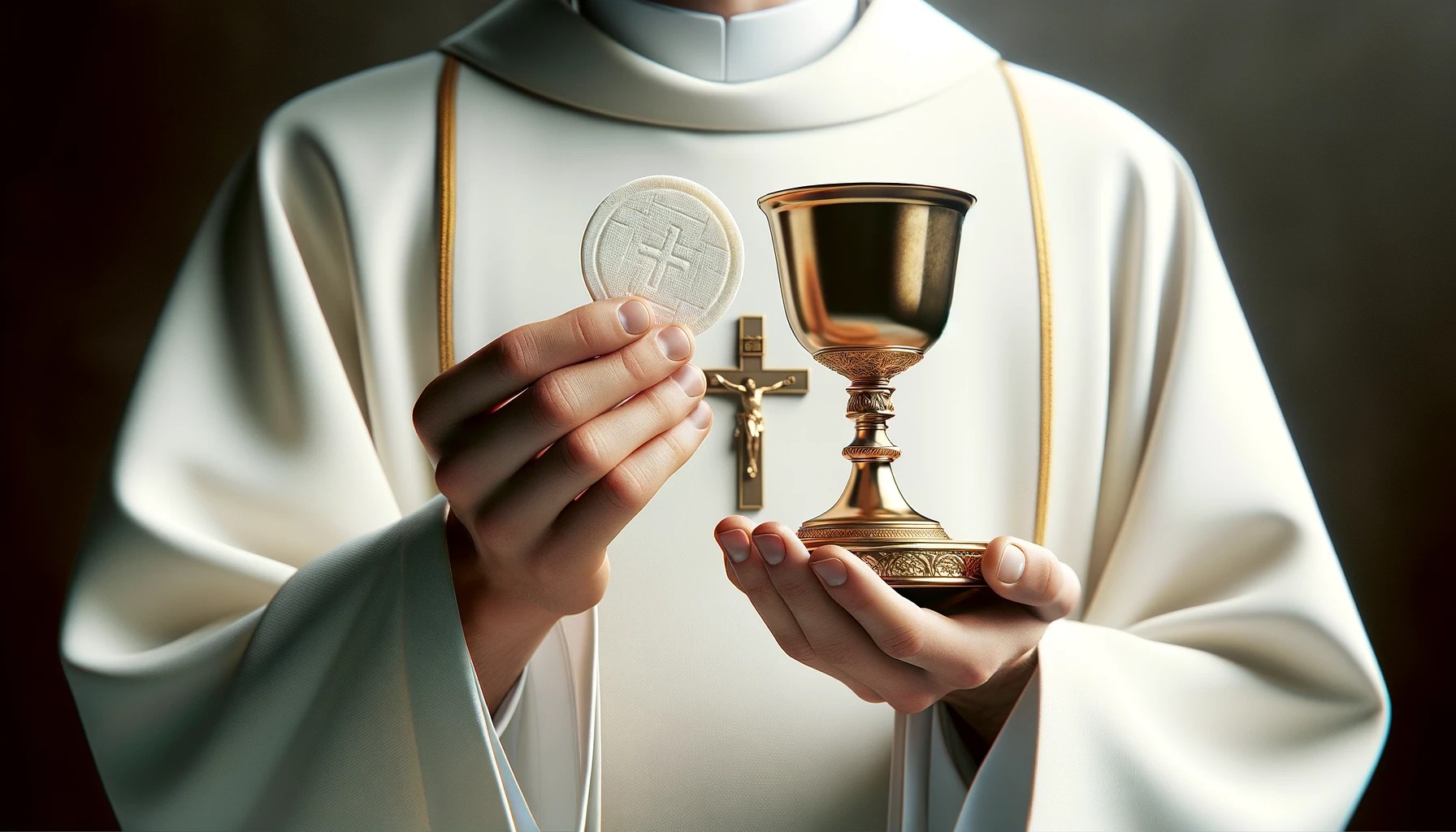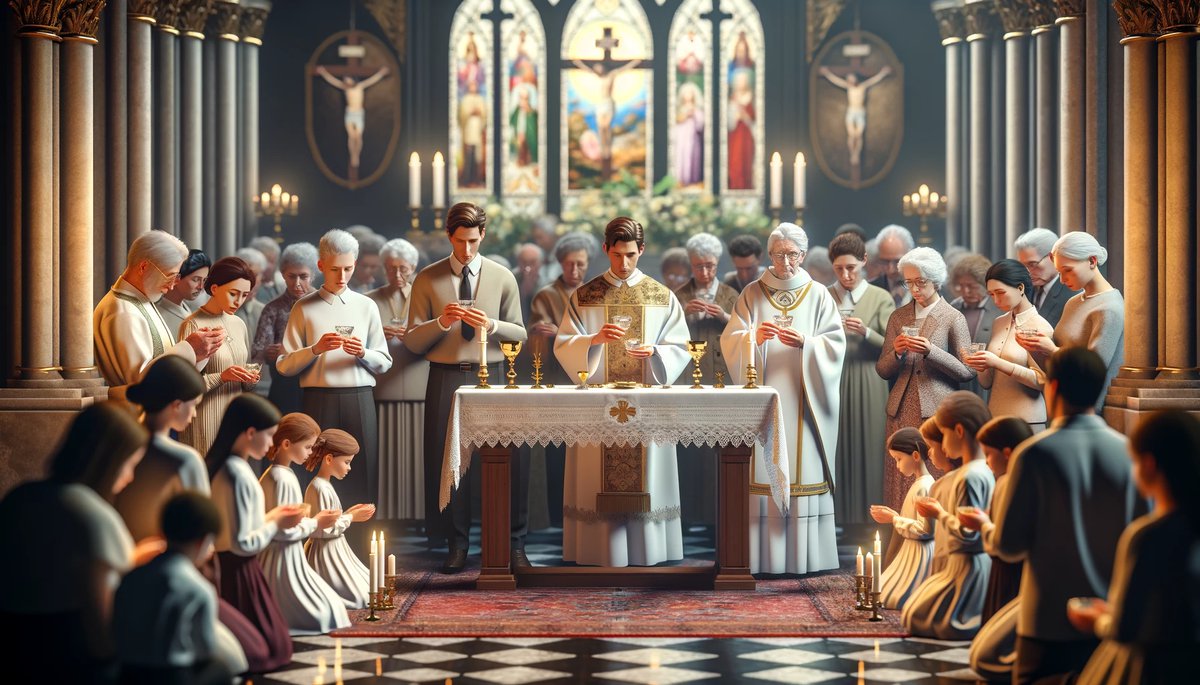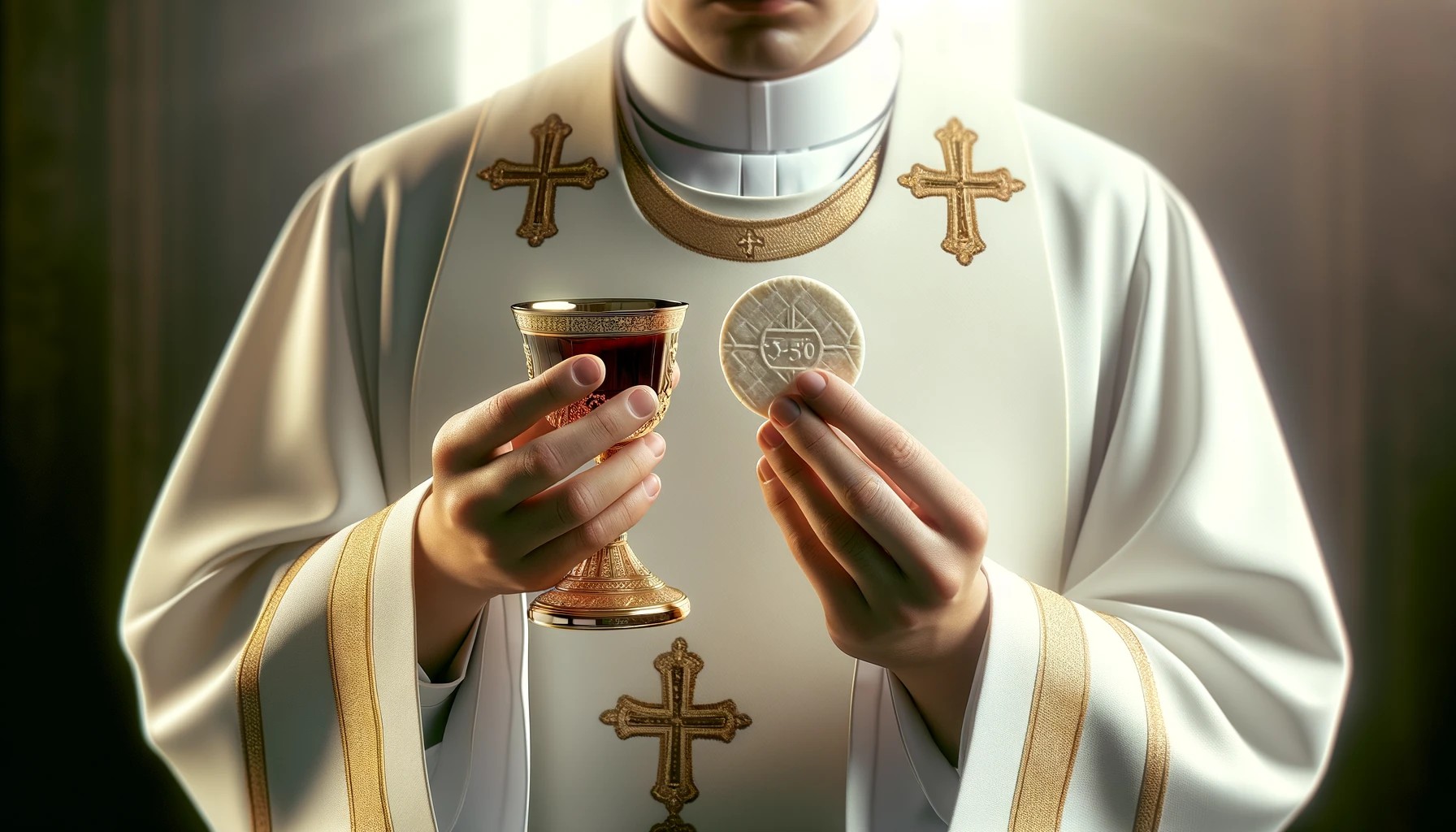Home>Theology and Spirituality>How Did Luther Change Holy Communion


Theology and Spirituality
How Did Luther Change Holy Communion
Published: February 19, 2024
Peter Smith, Editorial Director at Christian.net, combines deep insights into faith, politics, and culture to lead content creation that resonates widely. Awarded for his contributions to religious discourse, he previously headed a major organization for religious communicators, enhancing dialogue on faith's societal impacts.
Discover how Martin Luther's views transformed the practice of Holy Communion and its significance in theology and spirituality. Explore the impact of Luther's teachings.
(Many of the links in this article redirect to a specific reviewed product. Your purchase of these products through affiliate links helps to generate commission for Christian.net, at no extra cost. Learn more)
Table of Contents
Introduction
The transformation of Holy Communion, also known as the Eucharist or the Lord's Supper, during the Protestant Reformation was a pivotal moment in the history of Christianity. At the forefront of this reformation stood Martin Luther, a German monk and theologian whose profound insights and convictions reshaped the understanding and practice of the sacrament. Luther's influence on Holy Communion continues to reverberate through the centuries, shaping the beliefs and practices of millions of Christians worldwide.
In this article, we will delve into the significant changes that Martin Luther introduced to the understanding and observance of Holy Communion. We will explore Luther's early views on the sacrament, the pivotal moments that led to his reformation of the Eucharist, and the theological concept of consubstantiation that emerged from his teachings. Furthermore, we will examine the enduring impact of Luther's reforms on the Christian faith and the celebration of the Eucharist within Protestant traditions.
As we embark on this journey through history and theology, it is essential to grasp the profound implications of Luther's contributions to the understanding of Holy Communion. By gaining a deeper understanding of Luther's transformative influence, we can appreciate the rich tapestry of beliefs and practices that have shaped the diverse expressions of Christianity. Join us as we unravel the story of how Martin Luther's convictions and theological insights reshaped the sacred ritual of Holy Communion, leaving an indelible mark on the Christian faith.
Read more: How To Take The Holy Communion
Luther's Early Views on Holy Communion
In order to comprehend the magnitude of Martin Luther's impact on the understanding of Holy Communion, it is imperative to delve into his early perspectives on this sacred sacrament. During Luther's formative years as a monk and theologian within the Roman Catholic Church, the prevailing understanding of the Eucharist was rooted in the doctrine of transubstantiation. According to this doctrine, the bread and wine used in the sacrament were believed to undergo a metaphysical transformation, becoming the actual body and blood of Christ during the Mass.
Luther's early views on Holy Communion were deeply influenced by the theological framework of his time. As a devout adherent of the Catholic faith, he initially upheld the traditional understanding of transubstantiation. However, his contemplation of Scripture and his growing theological insights would eventually lead him to question and challenge the prevailing doctrines surrounding the Eucharist.
Luther's pivotal journey towards reforming the understanding of Holy Communion began to unfold as he grappled with profound theological questions and engaged in a rigorous study of the Scriptures. His immersion in the writings of the apostle Paul and his deep reflection on the nature of Christ's presence in the Eucharist sparked a transformative shift in his understanding of this sacred ritual.
As Luther delved into the biblical accounts of the Last Supper and the teachings of the early Christian church, he began to formulate a new perspective on the Eucharist that would ultimately diverge from the established doctrines of the Catholic Church. His evolving understanding of the sacrament would lay the groundwork for a profound reformation that would reverberate throughout the Christian world.
Luther's early views on Holy Communion, shaped by his theological inquiries and scriptural contemplation, set the stage for a radical reimagining of the Eucharist that would challenge centuries-old traditions and doctrines. This pivotal phase in Luther's theological journey would culminate in a momentous reformation of the sacrament, marking a significant turning point in the history of Christianity.
As we continue to unravel the narrative of Luther's transformative impact on Holy Communion, it is essential to grasp the profound theological and historical context that shaped his early perspectives and paved the way for the monumental changes that would unfold in the course of the Protestant Reformation.
Luther's Reformation of the Sacrament
Martin Luther's reformation of the sacrament of Holy Communion stands as a defining moment in the history of Christianity. As Luther delved deeper into his theological explorations and scriptural interpretations, he underwent a profound transformation in his understanding of the Eucharist. This pivotal shift in perspective would ultimately lead to a radical reformation of the sacrament, challenging the established doctrines and practices of the Catholic Church.
At the heart of Luther's reformation of the sacrament lay a fundamental reassessment of the nature of Christ's presence in the Eucharist. Departing from the doctrine of transubstantiation, which asserted a metaphysical transformation of the bread and wine into the literal body and blood of Christ, Luther began to articulate a different understanding of the sacrament. Central to his reformation was the emphasis on the real presence of Christ in the Eucharist, albeit in a manner that diverged from the traditional Catholic interpretation.
Luther's reformation of the sacrament was characterized by a return to the scriptural accounts of the Last Supper and a renewed focus on the words of institution spoken by Jesus Christ. Through his theological insights and exegetical analysis, Luther emphasized the significance of Christ's words, "This is my body" and "This is my blood," as foundational to the understanding of the Eucharist. This emphasis on the words of Christ underscored the real and substantive presence of Christ in the elements of bread and wine, albeit in a manner that transcended the confines of transubstantiation.
Furthermore, Luther's reformation of the sacrament was accompanied by a profound emphasis on the spiritual nourishment and consolation that the Eucharist imparted to the believer. He articulated a theology of grace and faith that underscored the transformative power of the sacrament in strengthening the believer's faith and fostering a deeper communion with Christ. This emphasis on the spiritual dimension of the Eucharist resonated deeply with the broader theological framework of Luther's Reformation, which centered on the primacy of grace and faith in the Christian life.
As Luther's reformation of the sacrament took shape, it sparked intense theological debates and controversies within the ecclesiastical landscape of his time. His bold articulation of a different understanding of the Eucharist challenged the entrenched authority of the Catholic Church and set in motion a seismic shift in the theological discourse surrounding the sacrament. The repercussions of Luther's reformation of the sacrament would reverberate far beyond his immediate context, leaving an indelible mark on the trajectory of Christian theology and practice.
In the wake of Luther's reformation, the Eucharist emerged as a focal point of theological reflection and ecclesiastical reform within the burgeoning Protestant movement. The diverse expressions of Protestantism that emerged in the wake of the Reformation would bear the imprint of Luther's reformation of the sacrament, shaping the beliefs and practices of numerous Protestant traditions. The enduring legacy of Luther's reformation of the sacrament continues to resonate within the tapestry of Christian worship and theology, underscoring the profound impact of his theological insights on the understanding and observance of Holy Communion.
As we reflect on Luther's reformation of the sacrament, it becomes evident that his transformative vision of the Eucharist transcended the confines of his historical context, leaving an enduring legacy that continues to shape the beliefs and practices of Christians across denominational boundaries. Luther's reformation of the sacrament stands as a testament to the power of theological conviction and scriptural interpretation in reshaping the contours of Christian faith and practice, leaving an indelible mark on the history of Christianity.
The Theology of Consubstantiation
The theology of consubstantiation represents a pivotal aspect of Martin Luther's reformation of the sacrament of Holy Communion. At the heart of this theological concept lies the profound understanding of Christ's presence in the Eucharist, a presence that diverges from the traditional doctrine of transubstantiation while offering a distinct perspective from the symbolic interpretation of the sacrament.
Consubstantiation, as articulated by Luther, posits a unique mode of Christ's presence in the elements of bread and wine during the Eucharist. Unlike the doctrine of transubstantiation, which asserts a metaphysical transformation of the bread and wine into the literal body and blood of Christ, consubstantiation emphasizes the coexistence of Christ's true presence with the physical elements of the sacrament. According to this theological framework, the substance of Christ's body and blood is believed to be present alongside the substance of the bread and wine, without necessitating a complete transformation of the latter into the former.
Luther's articulation of consubstantiation reflects a nuanced understanding of Christ's real and substantive presence in the Eucharist, while avoiding the metaphysical complexities inherent in the doctrine of transubstantiation. This theological perspective underscores the profound mystery of the Eucharist, affirming the tangible presence of Christ in the elements of bread and wine without necessitating a complete alteration of their physical properties.
Furthermore, the theology of consubstantiation aligns closely with Luther's broader theological framework, which emphasizes the tangible and transformative nature of God's presence in the material world. By affirming the coexistence of Christ's presence with the physical elements of the Eucharist, consubstantiation underscores the intimate connection between the spiritual and the material, reflecting Luther's profound theological insights into the sacramental nature of the Christian faith.
Luther's articulation of consubstantiation engendered significant theological discourse and debate within the context of the Reformation, shaping the understanding of the Eucharist within the emerging Protestant traditions. The theology of consubstantiation continues to resonate within the theological tapestry of Protestantism, offering a distinctive perspective on the sacrament of Holy Communion that reflects Luther's profound theological vision and his commitment to grounding Christian worship and practice in the tangible realities of human experience.
As we contemplate the theology of consubstantiation, we are invited to delve into the rich theological nuances that underpin Luther's reformation of the sacrament, embracing a vision of the Eucharist that transcends the doctrinal divisions of the past and speaks to the enduring mystery of Christ's presence in the sacred ritual of Holy Communion.
The Impact of Luther's Changes
Martin Luther's profound reformation of the sacrament of Holy Communion reverberated far beyond the theological debates of his time, leaving an indelible impact on the trajectory of Christian worship, theology, and ecclesiastical history. The enduring legacy of Luther's changes continues to shape the beliefs and practices of Christians across denominational boundaries, underscoring the profound influence of his theological insights on the understanding and observance of the Eucharist.
One of the most significant impacts of Luther's changes lies in the transformation of the Eucharistic liturgy within the emerging Protestant traditions. Luther's reformation of the sacrament engendered a renewed emphasis on the centrality of the Eucharist in Christian worship, underscoring its significance as a means of grace and spiritual nourishment for the believer. This heightened focus on the Eucharist as a sacred ritual of communion with Christ permeated the worship practices of the Protestant churches, shaping the liturgical expressions and theological ethos of diverse Protestant traditions.
Furthermore, Luther's reformation of the sacrament exerted a profound influence on the theological landscape of the Protestant Reformation, fostering a robust theological discourse on the nature of the Eucharist and Christ's presence therein. The theological debates sparked by Luther's changes engendered a rich tapestry of reflections on the sacramental nature of the Eucharist, contributing to the development of diverse theological perspectives within Protestantism. This theological diversity, rooted in Luther's reformation of the sacrament, continues to enrich the theological dialogue surrounding the Eucharist, reflecting the enduring impact of Luther's changes on the broader theological landscape of Christianity.
Moreover, Luther's reformation of the sacrament catalyzed a broader reassessment of the relationship between the clergy and the laity within the context of Christian worship. By emphasizing the spiritual significance of the Eucharist and its accessibility to all believers, Luther's changes challenged the hierarchical structures that had traditionally governed the administration of the sacrament. This egalitarian vision of the Eucharist as a communal act of worship and spiritual nourishment resonated deeply with the ethos of the emerging Protestant traditions, fostering a renewed sense of participation and engagement in the celebration of Holy Communion among the laity.
In addition, Luther's changes in the understanding and observance of Holy Communion contributed to the broader reformation of ecclesiastical practices and traditions within the Protestant churches. The theological principles underpinning Luther's reformation of the sacrament permeated the ecclesiastical ethos of the Protestant traditions, shaping their approach to sacramental theology, liturgical worship, and the spiritual formation of believers. This enduring impact of Luther's changes continues to shape the ecclesiastical identity and worship practices of Protestant churches, reflecting the profound imprint of his reformation of the sacrament on the fabric of Christian communal life.
As we contemplate the far-reaching impact of Luther's changes, it becomes evident that his transformative vision of the Eucharist transcended the confines of his historical context, leaving an enduring legacy that continues to shape the beliefs and practices of Christians across denominational boundaries. Luther's reformation of the sacrament stands as a testament to the power of theological conviction and scriptural interpretation in reshaping the contours of Christian faith and practice, leaving an indelible mark on the history of Christianity.
Read more: How To Wish Holy Communion
Conclusion
In conclusion, the transformative impact of Martin Luther's reformation of the sacrament of Holy Communion stands as a testament to the enduring power of theological conviction and scriptural interpretation in shaping the trajectory of Christian faith and practice. Luther's profound insights and theological vision engendered a seismic shift in the understanding and observance of the Eucharist, leaving an indelible imprint on the history of Christianity that continues to resonate within the diverse tapestry of Christian traditions.
Luther's journey from his early adherence to the doctrine of transubstantiation to his radical reformation of the sacrament reflects a profound theological evolution rooted in his contemplation of Scripture and his unwavering commitment to grounding Christian worship and practice in the tangible realities of human experience. His emphasis on the real presence of Christ in the Eucharist, coupled with his articulation of consubstantiation, fostered a rich theological discourse that transcended the doctrinal divisions of his time, shaping the theological landscape of the Protestant Reformation and beyond.
The impact of Luther's changes reverberated through the liturgical expressions, theological reflections, and ecclesiastical practices of the emerging Protestant traditions, fostering a renewed emphasis on the centrality of the Eucharist in Christian worship and underscoring its significance as a means of grace and spiritual nourishment for the believer. Furthermore, Luther's reformation of the sacrament catalyzed a broader reassessment of the relationship between the clergy and the laity, fostering a renewed sense of participation and engagement in the celebration of Holy Communion among the faithful.
As we reflect on the enduring legacy of Luther's reformation of the sacrament, it becomes evident that his transformative vision of the Eucharist transcends the confines of historical and denominational boundaries, leaving an indelible mark on the beliefs and practices of Christians across the spectrum of Christian traditions. Luther's unwavering commitment to grounding the Eucharist in the tangible realities of human experience, coupled with his profound theological insights, continues to shape the theological dialogue surrounding the sacrament, offering a compelling vision of the Eucharist that resonates with the enduring mystery of Christ's presence in the sacred ritual of Holy Communion.
In essence, Luther's reformation of the sacrament of Holy Communion stands as a testament to the enduring impact of theological conviction and scriptural interpretation in reshaping the contours of Christian faith and practice, leaving an indelible mark on the history of Christianity that continues to inspire and enrich the beliefs and practices of Christians across denominational boundaries.
